
Post-operative lymphatic ctDNA results exceeded plasma assays in detecting residual disease and predicting recurrence in HPV-independent HNSCC.

Your AI-Trained Oncology Knowledge Connection!


Post-operative lymphatic ctDNA results exceeded plasma assays in detecting residual disease and predicting recurrence in HPV-independent HNSCC.
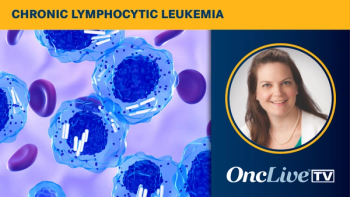
Kathleen A. Dorritie, MD, discusses data that inform the use of pirtobrutinib and liso-cel for the treatment of patients with chronic lymphocytic leukemia.

Kathleen A. Dorritie, MD, highlights important NCCN guideline updates and research to watch in hematologic malignancies.

Kathleen A. Dorritie, MD, discusses 2 clinical scenario cases to showcase differences in the management of newly diagnosed vs relapsed/refractory CLL.

Alexander B. Olawaiye, MD, discusses key efficacy and safety findings from the ROSELLA trial and the future of relacorilant in platinum-resistant ovarian cancer.
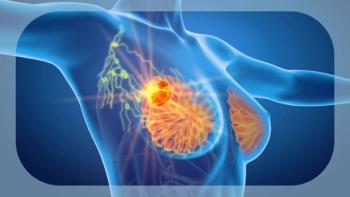
Bria-IMT plus checkpoint inhibition displayed a potential overall survival benefit in heavily pretreated, hormone receptor–positive breast cancer.
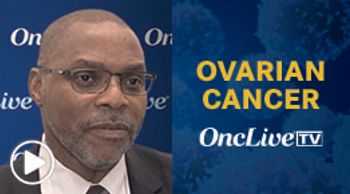
Alexander B. Olawaiye, MD, discusses future research that could inform the use of afuresertib plus paclitaxel in platinum-resistant ovarian cancer.
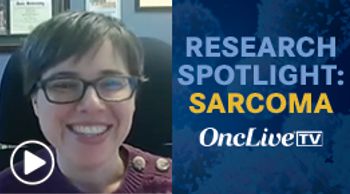
Yvonne Mowery, MD, PhD, discusses the SU2C-SARC032 trial of pembrolizumab plus radiotherapy followed by surgery in soft tissue sarcoma.
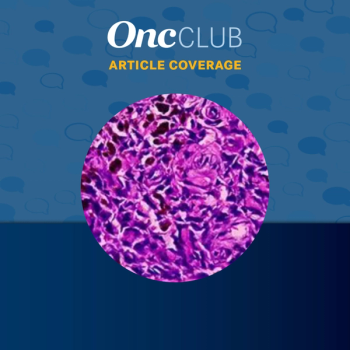
The addition of pembrolizumab to preoperative radiation therapy followed by surgery prolonged DFS in patients with soft tissue sarcoma of the extremity.
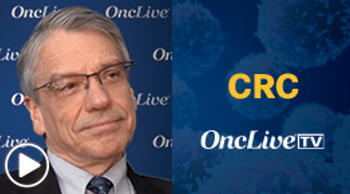
Charles E. Geyer, Jr., MD, discusses the efficacy and safety of perioperative atezolizumab plus chemotherapy in stage II/III triple-negative breast cancer.
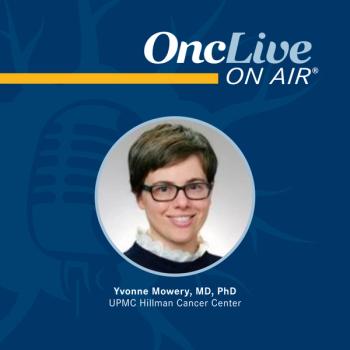
Dr Mowery discusses the SU2C-SARC032 trial of pembrolizumab plus preoperative radiotherapy and surgery in patients with soft-tissue sarcoma.
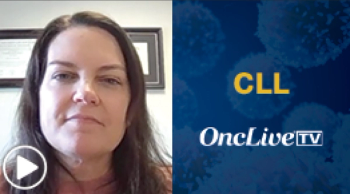
Kathleen A. Dorritie, MD, discusses 5-year of follow-up data from the CAPTIVATE trial in chronic lymphocytic leukemia and/or small lymphocytic lymphoma.

Adam M. Brufsky, MD, PhD, FACP, discusses the unique design of the allogeneic GM-CSF–secreting breast cancer vaccine SV-BR-1-GM.
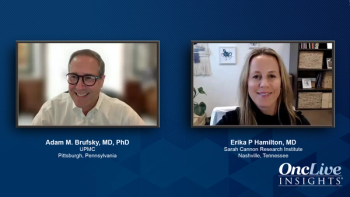
Adam M. Brufsky, MD, PhD, and Erika P. Hamilton, MD, share their perspectives on the future landscape of HR+/HER2- locally advanced or metastatic breast cancer treatment and provide essential insights to summarize the key points of their discussion.

Medical experts address the challenges of managing adverse events in the treatment of HR+/HER2- locally advanced or metastatic breast cancer.

Key opinion leaders discuss other clinical trials, including the EMERALD study, and targeted therapies for the treatment of HR+/HER2- locally advanced or metastatic breast cancer in later lines of therapy.

Erika P. Hamilton, MD, discusses the CAPItello-291 trial, which investigated the combination of capivasertib and fulvestrant in advanced HR+, HER2- locally advanced or metastatic breast cancer and led to its FDA approval, emphasizing the improved progression-free survival observed in patients with PIK3CA, AKT1, and PTEN alterations.
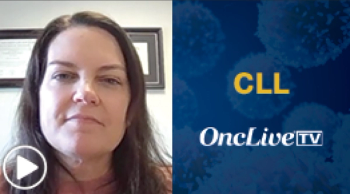
Kathleen A. Dorritie, MD, discusses unmet needs regarding upfront treatment selection in chronic lymphocytic leukemia.

The panel examines how resistance mutations influence the efficacy of subsequent treatment lines and delves into the process of selecting later-line therapies based on next-generation sequencing results.

Key opinion leaders explore the mechanisms of resistance that can develop after endocrine therapy and CDK4/6 inhibitor treatment in HR+/HER2- locally advanced or metastatic breast cancer, emphasizing the uncertain etiology of resistance and current hypotheses, while also examining biomarkers that may predict resistance to CDK4/6 inhibitors and endocrine therapy.

Adam M. Brufsky, MD, PhD, and Erika P. Hamilton, MD, delve into the most clinically significant genomic tests and biomarker assays employed in HR+/HER2- breast cancer, focusing on BRCA mutations, PIK3CA alterations, AKT1 alterations, and PTEN alterations, which play crucial roles in determining prognosis and guiding treatment decisions.

Medical experts share their strategies for choosing initial treatment options for HR+/HER2- locally advanced or metastatic breast cancer, debating the most effective frontline therapies based on clinical trial evidence, while also discussing their aspirations for a new standard of care, and the challenges of managing disease progression.

Peter Forsyth, MD, discusses a study of intrathecal dendritic cells in patients with leptomeningeal disease from TNBC or HER2-positive breast cancer.

Kathleen A. Dorritie, MD, discusses long-term data from trials in chronic lymphocytic leukemia presented at the 2023 ASH Annual Meeting.

Julia Foldi, MD, PhD, discusses the utility of of T-DXd and sacituzumab govitecan in the treatment of metastatic HER2-low and triple-negative breast cancer.

Julia Foldi, MD, PhD, discusses the evolving role of antibody-drug conjugates in the treatment paradigm for metastatic HER2-positive breast cancer.

Julia Foldi, MD, PhD, discusses interstitial lung disease associated with the use of T-DXd in HER2+ breast cancer.

Kathleen A. Dorritie, MD, discusses the significance of results from the phase 3 NCRI-FLAIR study in previously untreated chronic lymphocytic leukemia.
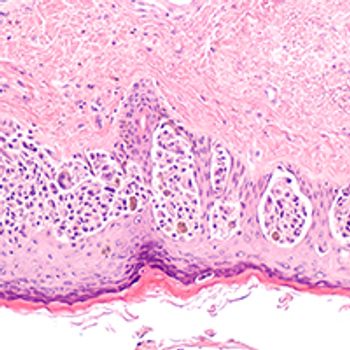
Immunogenomic information displays predictive capability in terms of immunotherapy resistance in metastatic uveal melanoma.

John M. Kirkwood, MD, discusses the significance of the FDA approval of adjuvant nivolumab for patients with resected stage IIB or IIC melanoma.